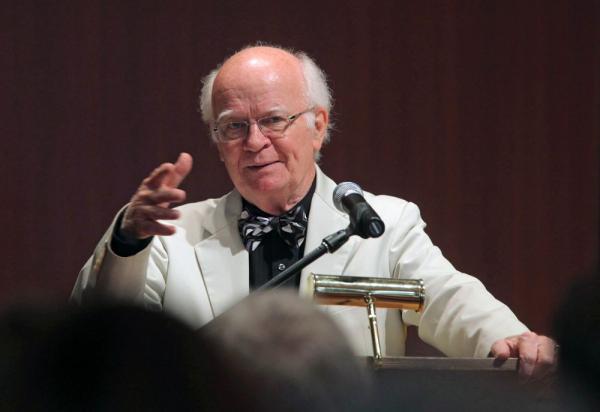Out of Many

Martin E. Marty speaks on "Pluralisms with a Big 'S'" at the Newberry Library
Credit: Newberry Library

Martin E. Marty speaks on "Pluralisms with a Big 'S'" at the Newberry Library
Credit: Newberry Library
America is often described as a nation of religious diversity and pluralism. But in a speech at the Newberry Library in Chicago, Martin Marty, the emeritus scholar of American religion, suggested that we err when conflating diversity and pluralism. Pluralism, Marty said, is “an energetic engagement with diversity.” Religious pluralism defines how Americans deal with religious diversity. Resting on the notion that one particular religion does not possess a monopoly on the truth, religious pluralism entails a dynamic process of dialogue, education, and mutual understanding.
Religious pluralism fosters a cultural environment in which choice, freedom and innovation thrive, said Marty, the Fairfax M. Cone Distinguished Service Professor Emeritus at the University of Chicago Divinity School, author of over fifty books and past winner of the National Humanities Medal. Pluralism requires an “active seeking of understanding across lines of difference,” he said. “Most of us could go along a long time and never have to do any active understanding of these differences usually until somebody else moved in in the neighborhood, and then you suddenly had to turn active and think it through.”
Marty’s speech was a focal point of the NEH-funded Summer Seminar for Community College Faculty, “Out of Many: Religious Pluralism in America.” Participants gathered at the Newberry Library at the end of June for the first component of the multi-year seminar. The seminar is a part of the NEH’s Bridging Cultures at Community Colleges program, launched in 2011 to advance humanities teaching at community colleges nationwide through sustained faculty and curriculum development.
Continuously, new people move into the great American neighborhood, a phenomenon that is not new, according to Marty. Religious diversity and the struggle to embrace religious pluralism are older than the nation itself. Seminar speakers illuminated connections between the past and present and demonstrated how issues in contemporary religious discourse have rich historical backgrounds.
Marty suggested that disparate religious traditions permeate the cultural geography of America, defining the identity of large and small communities alike. Lest we think we can pinpoint the home of America’s religious tradition in one particular locale, perhaps a centuries-old church in a small town in Massachusetts, or we think that the American religious tradition has no meaning whatsoever, in fact it lives in all places of worship, each as critical to the character of religion in America as the next.
Understanding the importance of localized religious traditions and places of worship and engaging with local and regional religious histories forms a foundation for pluralistic thinking. Such issues were of special significance to the twenty participants in the NEH-funded seminar. The participants shared the goal of building strong intellectual communities at their respective community colleges. Six community colleges -- College of DuPage in Glen Ellyn, IL, El Paso Community College in El Paso, TX, Georgia Perimeter College in Clarkston, GA, Ivy Tech Community College in Indianapolis, IN, McHenry County College in Crystal Lake, IL and Wilbur Wright College in Chicago, IL -- sent teams of faculty members to the program. One component of the program involved utilizing the extensive resources of the Newberry Library for individual research. Many of the teacher-scholars investigated the religious histories of their local areas and some plan to continue these research projects upon returning home.
But the impact of the NEH-funded program will extend beyond research. Each academic year, the twenty participants in the program teach nearly 5,000 students combined. Many participants plan to use the program as the foundation for improving and expanding the selection of religion classes and, in some cases, to create departments of religion at their respective community colleges.
Marty ended his talk with a brief commentary on the Jewish commandment to open one’s doors to strangers. “You won't become the other,” he said. “You don't give up what you are. But you open the door, you serve the meal, you learn, and you hear each other's stories.”